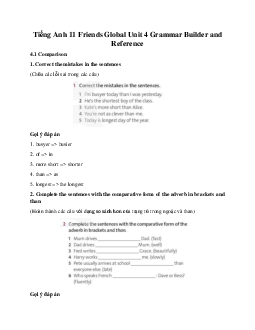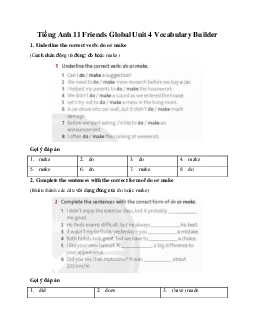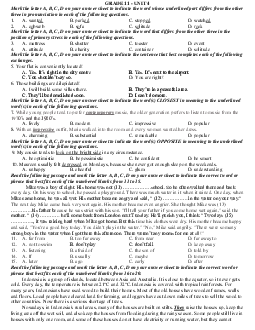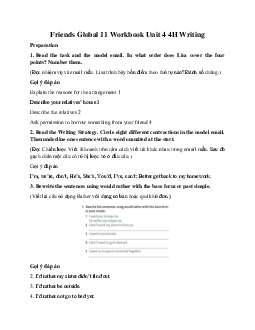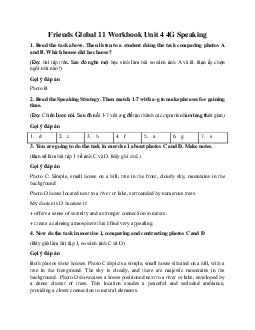





Preview text:
Giải Tiếng Anh 11 Unit 4: 4C Listening Bài 1
1. SPEAKING Work in pairs. Look at the photo, title and slogan opposite. What
happens on a 'Big Sleep Out', do you think? Read the article and check your answer.
(Làm việc theo cặp. Nhìn vào bức ảnh, tiêu đề và khẩu hiệu đối diện. Bạn có nghĩ điều
gì sẽ xảy ra trong 'Big Sleep Out' không? Đọc bài viết và kiểm tra câu trả lời của bạn.)
RAISING MONEY FOR PEOPLE WHO SLEEP ROUGH
Nobody knows exactly how many young people in the UK are homeless, but the
figure may be as high as 75,000. While the majority of homeless people are
unemployed, some have jobs but are still unable to afford accommodation. The Big
Sleep Out is a charity event which raises money to tackle homelessness among young
people. Big Sleep Outs happen all over the country. People who are not homeless
choose to sleep rough for one night. This raises a lot of money each year and reminds
politicians to look for a solution to the problem. Gợi ý đáp án
I think “Big Sleep Out” is an organization which helps the homeless. I guess they will
provide the homeless with blanket, coat to keep them warm and sleep well. Bài 2
Read Listening Strategy 1. Complete the definitions with the words below.
(Đọc Chiến lược Nghe 1. Hoàn thành các định nghĩa với các từ dưới đây.) contact enjoy ignore talk try
1. to turn a blind eye to something = to ______ something
2. to make a big effort = to ______ hard
3. to have the time of your life = to ______ yourself a lot
4. to have a word with somebody = to______ to somebody
5. to get in touch with somebody = to ______ somebody
Listening Strategy 1 (Chiến lược nghe 1)
When you listen to a recording, remember that many ideas will be expressed
differently in the task. For example, a simple verb in the task may be expressed by a
phrase in the recording (sleep well => get a good night's sleep)
(Khi bạn nghe đoạn ghi âm, hãy nhớ rằng nhiều ý tưởng sẽ được thể hiện khác nhau
trong bài tập. Ví dụ, một động từ đơn giản trong nhiệm vụ có thể được diễn đạt bằng
một cụm từ trong đoạn ghi âm (ngủ ngon => có một giấc ngủ ngon)) Gợi ý đáp án
1. to turn a blind eye to something = to ignore something
2. to make a big effort = to try hard
3. to have the time of your life = to enjoy yourself a lot
4. to have a word with somebody = to talk to somebody
5. to get in touch with somebody = to contact somebody Bài 3
Listen to two short recordings. Answer the questions. Use the verbs and phrases
in exercise 2 to help you.
(Nghe hai đoạn ghi âm ngắn. Trả lời các câu hỏi. Sử dụng các động từ và cụm từ
trong bài tập 2 để giúp bạn.) Speaker 1
1. Did she enjoy her Big Sleep Out?
(Cô ấy có tận hưởng ‘Big Sleep Out không?)
2. Did she talk to the organisers?
(Cô ấy có nói chuyện với ban tổ chức không?) Speaker 2
3. Does he think the organisers tried hard to publicise the event this year?
4. Did they contact the local newspaper last year? Gợi ý đáp án Đang cập nhật! Bài 4
Read Listening Strategy 2. Then listen to three recordings. Which excerpts
contain formal language? Use the table below to help you identify them.
(Đọc Chiến lược nghe 2. Sau đó nghe ba đoạn ghi âm. Đoạn trích nào có ngôn ngữ
trang trọng? Sử dụng bảng dưới đây để giúp bạn xác định chúng.)
Formal (trang trọng)
Informal (không trang trọng) Nghĩa increase sharply go up a lot tăng đáng kể offer/require assistance need help cần sự giúp đỡ a high priority very important rất quan trọng make a proposal suggest something đề xuất gì đó currently at the moment hiện tại gain employment find a job tìm việc làm
Listening Strategy 2 (Chiến lược nghe 2)
Pay attention to whether the language you hear is formal or informal. This can be an
important clue to the context.
(Chú ý xem ngôn ngữ bạn nghe là trang trọng hay không trang trọng. Đây có thể là
một đầu mối quan trọng cho bối cảnh.) Bài 5
Listen again. Choose the correct answers (a–c).
(Nghe lại. Chọn câu trả lời đúng (a–c).)
1 Who is Speaker 1 speaking to?
a. An audience at a conference
b. A friend who works for a charity c. A young homeless person
2 Speaker 2 thinks that older people
a. care more about homelessness.
b. are more likely to take part in the Big Sleep Out.
c. often don't have time to think about homelessness.
3 Who does Speaker 3 work for? a. A youth hostel b. A local business c. A city council Bài 6
SPEAKING Discuss these questions with your partner.
(Thảo luận những câu hỏi này với bạn của bạn.)
1. What would be the worst thing about being homeless?
The weather (thời tiết)
Being alone (một mình)
Other people's attitudes (thái độ của người khác)
Being uncomfortable (không thoải mái)
Personal safety (an toàn cá nhân) Hygiene (vệ sinh)
2. What should governments do to tackle the problem of homelessness?
3. What can individuals do to help the homeless?
I think the worst thing would be not having a bed/ feeling cold all the time / not being able to wash ...
